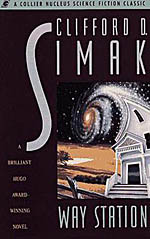
![]() charlesdee
charlesdee
7/31/2011
![]()
My disdain for science fiction reached its peak in the mid to late seventies. I was working in a used bookstore, and more and more of what went into the sf section featured dragons or gladiators with leopard heads on the cover. It was the fantasy invasion, and the baleful influence of J.R.R. Tolkien was everywhere. Spaceships gave way to cliff dwellings reached only by young couples in loin cloths riding pteradactyls. Overnight it seemed aliens went from looking like respectable, multi-tentacled, horny invaders from another galaxy to gnomic helpmates. Who could take such crap seriously?
I was egged on in my disdain by a co-worker who shared my feelings. He, too, had read science fiction as a child. (We were now in our ultra-mature mid-twenties.) We noticed that just about every other science fiction paperback we shelved had won a Hugo, a Nebula, or a some kind of award. How hard could it be, we wondered. We decided to have a contest to see which of us could win a Hugo or Nebula award before the other. It could be in any category, although we admitted that Life Time Achievement was setting the bar to high. The only requirement would be that the story, novella, or novel had to end with this sentence:
I never knew kweqwolhs could cry.
The idea probably kept us amused for the better part of an afternoon, but I thought of it again when reading Clifford D. Simak's Way Station. This novel did not win a Hugo or a Nebula, but it is saturated with the kind of writing that had convinced me by the mid seventies that science fiction was a second-rate genre no longer worthy of my attention.
The plot concerns one Enoch Wallace. (Now this sounds like a Twilight Zone introduction.) Enoch is a Civil War veteran who 150 years later continues to maintain his family's home in the backwood of Minnesota. Thanks to a visit by an intergalactic traveler, Enoch runs a way station for other such travelers and also never ages. People in the backwoods of Minnesota keep to themselves, we are made to understand, and so the oddity of Enoch's perpetual youth is noted but never inquired about. (And I thought I left my neighbors alone.)
Way Station does a have a plot, and if it had been written by some one else, say someone with a sense of humor, it could have been pretty good. Of course Enoch is not a sophisticated man, although over a century of contact with species from across the galaxies has given him a perspective on life not likely to be shared by his Minnesota hillbilly neighbors. But there is a deadly earnestness to the prose that expresses this thoughts that would not be out of place in a high school literary magazine.
He stood upon the rock and stared out across the river, watching the lazy hawk and the sweep of water and the green carpeting of trees, and his mind went up and out to those other places until his mind was dizzy with the thought of it. And then he called it home.
Simak's treatment of his very special female character, a mute young lady from an abusive backwoods family who can heal the broken wings of butterflies, is especially cringe-inducing. But she does have her good points, as when she turns out to be the key link between some pissed off aliens and the annihilation of the earth. ("A little child shall lead them.")
Of the mid-century sf I have read over the past month or so, this is the third novel to concern itself with mankind's readiness to enter the galactic fraternity of advanced beings. The topic must have been in the air during the 1950's, a neat fit with threats of atomic annihilation, UFO sightings, and cold war politics in general. Looking ahead to what comes up next on the Pringle list, writers soon seem determined to prove that their dystopian vision of the future could outdo that of their peers.
http://www.potatoweather.blogspot.com